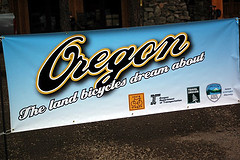Oregon placed fourth in a new ranking of Bike Friendly States that was released tonight by the League of American Bicyclists.
Washington took top honors, followed by Wisconsin and then Arizona. At the bottom of the list were Alabama and Georgia, with West Virginia coming in last.
Yesterday, I sat down with the League’s executive director Andy Clarke and Bike Friendly State program manager Jeff Peel to learn more about the rankings.
In this initial ranking, each state’s bike coordinator was sent a 75-part questionnaire that probed into six different categories: Legislation, Policies & Programs, Infrastructure, Education & Encouragement, Evaluation & Planning, and Enforcement. Each question had a point value from 1-3 (all questions were weighted equally) and the overall rankings were based on that cumulative score.
“There’s something good in all the states, but in some it’s just a little harder to find.”
— League of American Bicyclists Executive Director Andy Clarke
According to Peel, the Legislation category included questions about where cyclists are allowed to ride, whether or not the state has a vehicular homicide and/or cell phone law, what the blood-alchohol content limit is, and so on.
The Evaluation & Plans category included questions about whether or not a state has a bike master plan (and if it’s being monitored for progress), if bike usage data is known and whether or not the state has an official and active bike advisory committee.
States that ranked high in the Infrastructure category scored well on questions like how many miles of dedicated bike trails they have and how much of their federal Transporation Enhancement funds are actually spent (unspent TE funds are sent back to the Feds).
In the Enforcement category, program manager Peel said, “Across the board, with all 50 states, the Enforcement category was really lacking in quality. Everyone needs to improve in this area.” The types of questions in this category included whether or not bicycling enforcement is a police academy requirement, whether bike laws and information about the rights and responsibilities of cyclists are put in the hands of traffic court judges, and so on.

Oregon ranked high in most of the categories except for Legislation (27th) and Evaluation & Planning (18th). Peel said Oregon’s bike master plan hasn’t been updated since the early 1990s and that our statewide advisory group (the Oregon Bicycle and Pedestrian Advisory Committee) only meets quarterly, unlike the monthly meetings of some other states.
Washington is ranked #1 in four of the six categories. I’m sure the Cascade Bicycle Club, one of the largest (over 10,000 members), deep-pocketed (they get 60% of their revenue from popular events like the Seattle-to-Portland Classic and the Seattle Bike Expo) and most politically active (they do a ton of lobbying) advocacy groups in the country, has a lot to do with that.
On the other end of things, West Virginia came in dead last in all but one category (where they ranked 49th).
But what about Oregon? Fourth?!
I bumped into Oregon’s state bike coordinator Sheila Lyons at the conference and she was dreading having to defend that placing. She said she spent 20-30 hours completing the questionnaire and thought we’d rank higher. “I thought we’d do better, but it will be helpful for us to look at some areas we need to work on.” That being said, Lyons feels there are, “Some things that are happening in Oregon that just can’t be captured by a questionnaire.”
Clarke said that initially, “We were a bit nervous how people would feel about getting ranked.” He then emphasized that the rankings are meant to be purely constructive. “We’re not doing this to make anyone look bad,” he said.
Like their Bicycle Friendly Communities program, Peel said that he hopes states begin to use the rankings as a way to compare and outdo one another. He said the League is, “Hoping to create some stiff competitions.”
From now on, Peel says the Bike Friendly State program will have two parts. They’ll continue to rank each state annually, with the state bike coordinators able to update their answers as improvements are made. Then, the second part of the program will mimic the League’s successful Bicycle Friendly Community program. Peel says in the next month or so they’ll have an application ready that will give states an opportunity to apply for medal rankings (from Bronze to Platinum) by answering more in-depth questions about their policies and activities.
With these rankings sure to raise the ire of some transportation officials, Clarke offered this politically safe statement, “There’s something good in all the states, but in some it’s just a little harder to find.”
Look for the full results to be posted online soon at the Bicycle Friendly State website.


